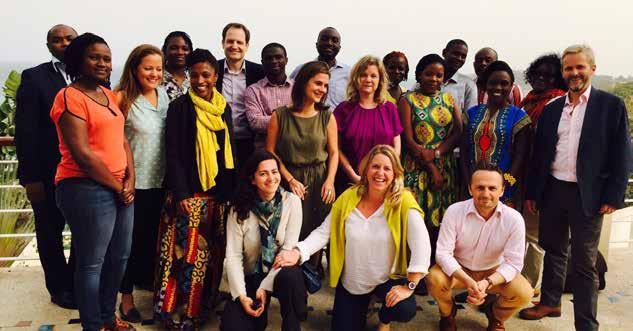
3 minute read
30 Years at the BBC
I set my sights on a career in international journalism as a teenager and finally found my way into the BBC in 1990 as a radio reporter. It was an historic time for international news following the fall of the Berlin Wall and the revolutions of former communist Eastern Europe.
The first Gulf War saw the innovation of a new concept of rolling news and I moved to television as one of the founding producers on BBC World News. 1997 was a turning point as I was involved in global coverage of the Labour victory in the UK and then the death of Princess Diana. By some strange coincidence, Mother Teresa died at around the same time and one of the most ambitious projects I found myself producing was an 8-hour TV special covering her funeral in Calcutta. We filmed from a hotel room and had to knock out walls to create a window wide enough to see the action on the street below.
Advertisement
Shortly after that, I landed my first foreign posting as the BBC’s Europe producer
Jonathan Chapman (F 75) reporting on Nelson Mandela’s death based in Brussels. In political terms, it was the calm before the storm of the UK’s relationship with the EU under the Blair governments and there was huge optimism among Europeans with the launch of the Euro. We travelled to every corner of the continent for our coverage of major events such as the Kosovo War, elections, freak weather and social unrest. The Danes paved the way for EU referenda to decide whether to join the Euro: first time round they voted no; so they held another election; and this time they voted yes! One of the toughest stories covered was the Concorde crash, soon after take-off from Charles de Gaulle airport, killing everyone on board. The tragedy presaged the final demise of the aircraft’s commercial use.
My first day back in the UK was in September 2001 and then I spent most of the next four years in the US, firstly covering the aftermath of 9/11 from New York and then helping our Washington bureau steer the coverage of the 2004 Bush re-election. I
Democrat convention in 2004 where unknown Senator Obama was the star of the show Jonathan (right) with BBC Africa reporters in Dakar
Jonathan Chapman (F 75)
finished a 30-year career with BBC News earlier this year, to join the world of international development. We are delighted to share some of his broadcasting experiences…
returned regularly to the US after that, most dramatically for Hurricane Katrina in 2005 which decimated New Orleans.
Taking over the BBC’s plans for the coverage of the funeral of Nelson Mandela led me to my final assignment as the Africa bureau editor based in Nairobi for five years. I was in charge of news in English for TV, radio and online from the continent for UK and global audiences. The African audiences make up around half of the corporation’s international audiences and new UK government investment allowed us to significantly expand our operations. Nairobi became the largest BBC bureau in the world with 10 language services operating out of Lagos, Abuja and Dakar.
It was this final posting that had the deepest impact on me personally and I decided, when it ended, to continue my relationship with the continent but through the prism of an international development organisation, hence my current position with the communication team of WaterAid. But, I am forever grateful for my years with the finest international broadcaster in the world.

Jonathan would be happy to talk to any OUs who might be looking towards a career in the media; please contact the OU team and we will put you in touch.











